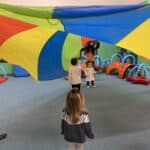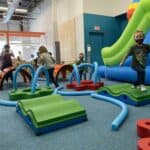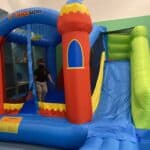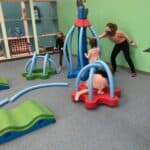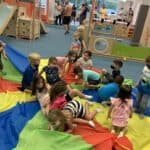Children are naturally social beings and have a need to interact with others. As they grow, they learn to bond with their primary caregivers but they must also learn to form social relationships with other people. Regular social interaction helps children develop a sense of confidence and self-esteem. It also helps them feel a part of a group and build friendships throughout their school life.
1. It Builds Confidence
Social interaction is the ability to communicate with other people, interpreting what’s happening, and then responding accordingly. It involves a number of skills that we all learn as children and it’s something we continue to use throughout our lives. A child’s social development is a long process that begins from birth. Developing these bonds and socializing with other babies, toddlers, and preschoolers builds a child’s confidence. A child’s ability to work with others is vital for a variety of educational and career outcomes. Children who have strong communication and collaboration skills are more likely to succeed in school and the workplace and they’re also happier with themselves.
2. It Builds Self-Esteem
Children with good self-esteem are more likely to do well in school, have better relationships, and have healthy mental health. They are also less likely to engage in antisocial behavior. You can help your child develop their self-esteem by encouraging them to make new friends, go out with their family and get involved in sports or other in-person activities. You can also give them balanced feedback.
3. It Builds Social Skills
The right social skills can help children make friends, share with their peers, and cooperate in social environments. These skills can also benefit their mental health and cognitive development. Taking turns in a conversation, using appropriate eye contact and verbal reasoning are all social interaction skills that can be taught. Kids need to learn how to use these skills so that they can interact in a more confident manner. Getting your child involved in a preschool or daycare setting is a great way to teach them these social skills. They will be in a setting that challenges them to take turns, resolve conflicts, show empathy and be leaders.
4. It Builds Friendships
Friendships help children to feel a sense of belonging, which can increase their self-esteem and boost their confidence. They also help them to build social skills, such as understanding social cues and communication skills. Friendships can happen with people at school, with family and even with people outside of the home. It doesn’t matter if your child is young, old or has a disability – they need to have friends.
5. It Helps Your Child Develop Communication Skills
Children initially learn how to communicate through interaction with their parents, caregivers, and peers. These interactions are a critical part of socialization, which fosters empathy, communication skills, learning and a sense of self. It is important for children to develop social skills as early as possible in order to prepare them for the school years. Exposing them to different social situations, such as going to the park or hosting playdates at home, can help them become comfortable with group settings.


